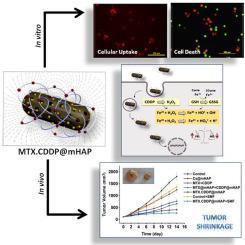Biomaterials Advances ( IF 5.5 ) Pub Date : 2021-06-07 , DOI: 10.1016/j.msec.2021.112238 Laya Khoshtabiat 1 , Azadeh Meshkini 2 , Maryam M Matin 3

|
Fenton-based therapy is emerging as an effective and selective strategy against cancer. However, a low concentration of transition metal ions, insufficient endogenous H2O2, and a high level of antioxidant activity within the cancer cells have hindered the therapeutic efficacy of this strategy. To address these issues, in this study, the Fenton reagent (magnetic hydroxyapatite, mHAP) was accompanied with chemotherapy drugs (cisplatin (CDDP) and methotrexate (MTX)) and static magnetic field (SMF), in such a way to be a pH-, redox-, and magnetic-responsive nanoplatform. In vitro and in vivo experiments revealed higher toxicity of the final construct, MTX.CDDP@mHAP, toward colon cancer cells, as compared with that of free drugs. The most effective antitumor activity was observed as MTX.CDDP@mHAP-treated tumor cells were exposed to SMF (0.9 T) and no noticeable damage was observed in the normal cells and tissues. Active targeting by MTX and magnetic targeting by mHAP under magnetic field increased the tumor selectivity and enhanced the tumor site accumulation and cellular uptake of MTX.CDDP@mHAPs. The released iron ions within the cancer cells trigger the Fenton reaction while the release of chemotherapy drugs, reduction of intracellular glutathione, and application of SMF aggravated the Fenton reaction, subsequently leading to the generation of reactive oxygen species (ROS) and induction of apoptosis. Therefore, Fenton magnetic-based therapy-mediated by MTX.CDDP@mHAP could be considered as a promising strategy against colon cancer with high therapeutic efficiency and biosafety.
中文翻译:

双化学药物磁性羟基磷灰石治疗结肠癌的芬顿磁疗法
基于芬顿的疗法正在成为一种有效的、选择性的抗癌策略。然而,低浓度的过渡金属离子、内源性H 2 O 2不足以及癌细胞内的高水平抗氧化活性阻碍了该策略的治疗效果。为了解决这些问题,在本研究中,芬顿试剂(磁性羟基磷灰石,mHAP)伴随化疗药物(顺铂(CDDP)和甲氨蝶呤(MTX))和静磁场(SMF),以这样的方式成为pH值-、氧化还原和磁响应纳米平台。体外和体内实验表明,与游离药物相比,最终构建体 MTX.CDDP@mHAP 对结肠癌细胞的毒性更高。当 MTX.CDDP@mHAP 处理的肿瘤细胞暴露于 SMF (0.9 T) 时,观察到最有效的抗肿瘤活性,并且在正常细胞和组织中没有观察到明显的损伤。MTX的主动靶向和mHAP在磁场下的磁性靶向增加了肿瘤选择性并增强了MTX.CDDP@mHAPs的肿瘤部位积累和细胞摄取。癌细胞内释放的铁离子引发 Fenton 反应,而化疗药物的释放、细胞内谷胱甘肽的减少和 SMF 的应用加剧了 Fenton 反应,随后导致活性氧 (ROS) 的产生和细胞凋亡的诱导。所以,











































 京公网安备 11010802027423号
京公网安备 11010802027423号